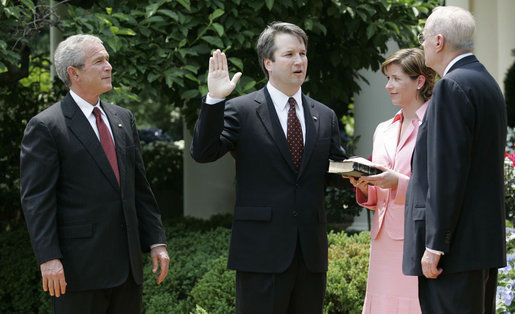Editorial: Prioritize truth for the Kavanaugh nomination

President George W. Bush Attends Swearing-In Ceremony for Brett Kavanaugh to the U.S. Court of Appeals for the District of Columbia Circuit, June 1, 2006, in the Rose Garden.
October 1, 2018
The United States Supreme Court has been a divisive topic within the political realm long before Justice Anthony Kennedy announced his retirement in June.
The next individual to have a seat on the court has the ability to set the path forward for America’s justice system for the next 30 to 40 years — a responsibility and privilege not to be taken for granted.
And with Kennedy’s departure, a hole was left in the middle of court which left Republicans vying for and Democrats fighting against a reliable conservative.
Yet less than one month after Kennedy’s predicted retirement, as protesters crowded outside the steps of the Supreme Court in Washington, President Donald Trump announced his nomination for the next justice — Brett Kavanaugh.
Republicans praised Trump’s decision in picking Kavanaugh for his alignment with the conservative wing. And with midterms looming, Kavanaugh’s nomination needed to be swift. Should Democrats overturn the Senate in November, the GOP was fully aware that any nominee put forth by Trump could be blocked.
However, one thing the general public did not see coming, yet could have predicted in the #MeToo era, was the accusation of Kavanaugh in the sexual assault of Christine Blasey Ford.
As last week’s hearings enthralled a nation — Democrats stood behind Ford while several Republicans suggested the delay in Ford’s coming forward was motivated by partisanship.
This political fighting is unnecessary, unnerving and inappropriate. When debating one’s appointment to the high court, the decision should not be based on maintaining a majority in the high court, but rather the credentials and history of the nominee — both at a public and private level.
This nomination especially shouldn’t be used to help bolster one’s campaign or run for political office.
It is clear that no matter the decision the Senate comes to following an FBI investigation regarding Kavanaugh’s past that this point of time will be written into history — both emblematic of the current political, and societal, climate as the United States begin to navigate the culture that has positioned us to this point.
What should be prioritized by the public, politicians and the FBI investigation is finding the truth. While the future of the court is important, what matters now for those involved — especially Ford and Kavanaugh whose lives are at the center of this debate — is the continued search for what really happened that night rather than the political circus the nomination has transitioned into.
















